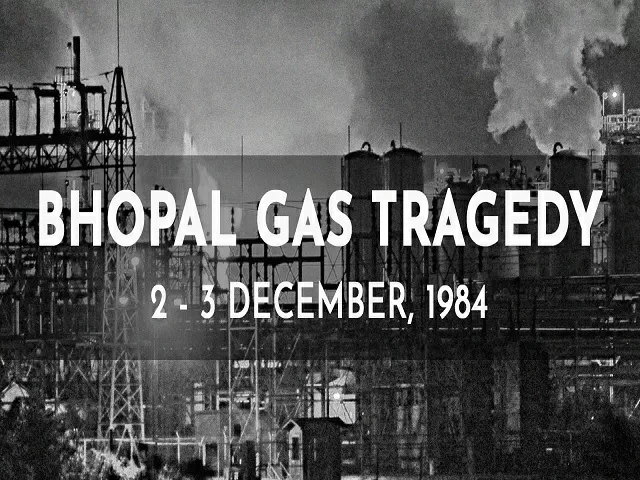Bhopal Gas Tragedy: On the intervening night of 2-3 December in 1984, Union Carbide India Limited (UCIL) pesticides plant in Bhopal began leaking around 40 tonnes of destructive methyl isocyanate (MIC) gas into the air. Gradually, a cloud of gas started descending and enveloping the city of hills and lakes, thereby turning it into a gas chamber.
As a result, around half a million residents were exposed to the gas. Of these, around 20,000 people died. While Union Carbide maintains that 3,800 people died, the Municipal workers argue that they moved at least 15,000 bodies for the last rites (estimates vary on death toll).
Over 12,000 people still suffer from the ill effects of infirmities brought about by the Bhopal Gas Tragedy and the resulting contamination at the plant site including blindness, extreme difficulty in breathing and gynecological disorders.
What led to the Bhopal Gas Tragedy?
While the cause of the Bhopal Gas Tragedy remains debatable to date, the Government of India maintains that negligent management and deferred maintenance caused a backflow of water into a MIC tank, caused a chemical reaction that forced the pressure release valve to open, and allowed the gas to leak.
However, Union Carbide Corporation (UCC) maintains that it was an act of sabotage as only an employee with the required skillset and knowledge of the site can temper with the tank which triggered the disaster.
The Aftermath of Bhopal Gas Tragedy
Being one of the world's worst industrial disasters, Bhopal Gas Tragedy took thousands of lives and affected the survivors in various degrees. Along with humans, livestock was killed, injured, and infected, and flora and fauna were disturbed.
Dead bodies of animals and human beings blocked the streets, leaves and flowers turned black and the smell of burning chili peppers enveloped the air. Such was the magnitude of the tragedy that all the available instruments in the field of medical services, organization and law were inadequate.
While the world was learning about the holocaust in shocked disbelief, the state took over and rendered yeoman service to tackle the aftermath of the disaster.
The reports available on the incident mention that two government hospitals of Bhopal treated around 50,000 patients within two days of the Bhopal Gas Tragedy.
Is Bhopal still toxic?
In 1999, water testing near the site of the incident highlighted that the mercury levels are much higher than normal. Cancer, brain damage and birth-deformity-causing chemicals were found in water.
A 2002 report revealed the presence of poisons such as 1,3,5 trichlorobenzene, dichloromethane, chloroform, lead and mercury in the breast milk of nursing women.
Around 400 tons of industrial waste were as yet present on the site in the early 21st century. The Michigan-based Dow Chemical Company that purchased the UCIL in 2001 steadfastly refused to clean up the site, provide safe drinking water, and compensate the victims. It further refused to disclose the composition of the gas leaked, a piece of information that could help doctors treat the victims.
Bhopal Gas Tragedy: What do the survivors have to say?
Aziza Sultan, a survivor was quoted by The Bhopal Medical Appeal as saying, "At about 12:30 a.m. I woke to the sound of my baby coughing badly. In the half-light, I saw that the room was filled with a white cloud. I heard a lot of people shouting. They were shouting ‘run, run’. Then I started coughing, with each breath seeming as if I was breathing in fire. My eyes were burning."
Champ Devi Shukla, another survivor of the industrial disaster was quoted by The Bhopal Medical Appeal as saying, “It felt like somebody had filled our bodies up with red chillies, our eyes had tears coming out, noses were watering, we had froth in our mouths. The coughing was so bad that people were writhing in pain. Some people just got up and ran in whatever they were wearing or even if they were wearing nothing at all. Somebody was running this way and somebody was running that way, some people were just running in their underclothes. People were only concerned as to how they would save their lives so they just ran."
"Those who fell were not picked up by anybody, they just kept falling and were trampled on by other people. People climbed and scrambled over each other to save their lives – even cows were running and trying to save their lives and crushing people as they ran, " she further added,
Rashida Bi was quoted by The Bhopal Medical Appeal as saying, "Those who escaped with their lives are the unlucky ones; the lucky ones are those who died on that night." Bi lost five gas-exposed family members to cancers.
It is to be noted that 37 years on, the survivors are still being tormented with an epidemic of cancers, menstrual disorders and monstrous births as the site has never been cleaned up properly.
Also Read | National Pollution Control Day 2021: History, Significance, Objectives and Key Facts
